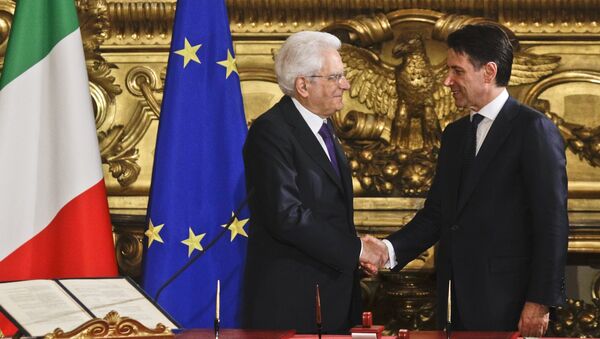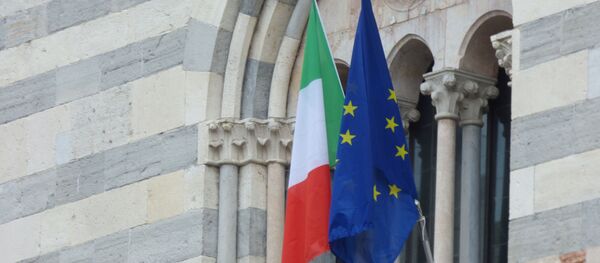Sputnik spoke with Salvatore Villani, Assistant Professor of Public Economics at University of Naples Federico II for more insight on the latest developments.
Sputnik: What is your prognosis for Italy’s future? Is the political uncertainty really over?
Salvatore Villani: Formation of the new populist government of Giuseppe Conte only temporarily reduces the uncertainty about the Italian political situation. This uncertainty would, in fact, be increased by the holding of new elections. However, I think that this government starts anyway with a burden represented by the loss of credibility in the completing of the consolidation process of public accounts which is to date fundamental to facilitate economic recovery in Italy.
In the current phase, as the recovery of the Italian economy appears more solid, the concerns of the new government should go to focus mainly on the high level of debt in relation to GDP and on the need for its reduction.
In recent years Italy was able to score numerous points in favor of itself in the battle for the democratization of EU's structures and procedures and for the substantial correction of austerity policies, succeeding in obtaining significant flexibility in favor of investments and reverse the recessionary cycle of its economy.
This action provided decisive support for the QE strategy, which was applied by a foresighted Mario Draghi and enabled Italy to start the reduction of the huge abyss of public debt and enjoying low interest rates on the domestic market.
This precious heritage of political credibility of our country has been squandered in a few weeks marked by endless tacticisms and irresponsible announcements of basically short-sighted politicians, much more careful to keep the stock markets calm than to implement political strategies aimed at long-term objectives.
Sputnik: What actions are we to expect from the Italian government when it comes to domestic affairs?
Salvatore Villani: After obtaining trust from the Parliament, the new Italian government will get to work to implement the contract between the two political forces that support it. These latter have not set any priorities, but one of the hypotheses is that, in the first 100 days of this government, the aforesaid political forces will try to implement first of all the pension reform.
Sputnik: How would the new government be dealing with the country's ailing economy and migration?
Salvatore Villani: In my opinion, Italy should first try to re-launch its growth potential (which is stagnating due to the weak labor productivity) by accelerating the rhythm of reforms and completing those being implemented, such as the implementation of fiscal federalism (Law No. 42/2009) and the reform of the tax system intended as a whole (Law No. 23/2014). The two reforms are closely interrelated and, for this reason, the two reform paths should continue side by side.
Then, the new Italian government should aim to improve the ability of socio-economic system to recover from external shocks. As I have shown in some of my recent research, the factors that could contribute to strengthening the resilience of socio-economic system are the degree of openness of the economy, the improvement of the business environment (by the reform of judicial proceedings, the norms on the insolvency and the taxation of enterprises), the sustainability of public debt and investment in human capital.
Italy should then push for the adoption of common European policies of migration and taxation, because a wise management of migratory flows and taxation systems can help to reduce income inequality and increase social well-being.
Sputnik: What changes can take place on Rome’s approach to international affairs? Could we expect Italy to pressure for lifting of anti-Russian sanctions, for instance?
Salvatore Villani: As I have already explained, EU member countries can increase their resilience to external economic shocks only if they continue to increase the openness to the outside of their economies.
The Russian sanctions are a huge disaster for Italy and for EU. They produce devastating effects on the economy and businesses that trade in Russia. Convincing Brussels to abandon these sanctions should be the first thing that the new Italian government must do.
Sputnik: Now, Jean-Claude Juncker said that "Italians need to work harder, be less corrupt and stop looking to the EU to rescue the country’s poor regions". What is your take on this statement and the its timing? What could be the ultimate goal of this rhetoric?
Salvatore Villani: Juncker was answering a question on Southern Italy, on the highest level of unemployment in that part of the country and on the ineffective and inefficient use of European funds by the Southern Regions. Behind this answer, in my opinion, there is no rhetoric, but a stark reality: Italy has never been able to really solve the problem of underdevelopment in the Mezzogiorno.
This issue has been placed at the center of the Law on Fiscal Federalism, precisely, in the point where the standard costs and the infrastructural equalization are regulated. In the first case, however, the implementing measures were rejected by the Constitutional Court and the solution to the problem was further postponed.
In the second case, I would like to underline the extreme slowness of the country's infrastructural equalization process, which seems to follow mainly the market logic and the demand for factor mobility rather than choices oriented to the economic and social rebalancing of the territory.
The equalization system adopted in Italy is financially unsustainable and far from satisfying the expectations of efficiency, effectiveness and equity originally envisaged. The progress of the equalizing balancing of resources should be accompanied, in my opinion, to an effective growth of the level of tax autonomy of the local governments, because fiscal autonomy and equalization are two aspects inextricably linked to each other and it is not possible to regulate the equalization without solving the nodes of local financial autonomy.
It is not suitable to encourage convergence towards more uniform performance standards on the territory and it can only serve to generate yet another financial illusion, consisting in concealing the responsibilities of the State towards the local governments which are historically poorly equipped of resources (financial and infrastructural) and incapable of exercising an autonomous fiscal effort or, alternatively, a reduction in expenses inefficient. On the other hand, there is the problem of high and unequally distributed tax pressure, which distorts incentives and weighs less and less on the wealthier classes, as well as on the richest part of the country.
Sputnik: How would Rome’s relations with Brussels develop moving forward? Is the row between Italy and the European Union far from over?
Salvatore Villani: The direct line with Europe is always active and it will never be interrupted. Italy has a great desire to be a protagonist in Europe. The latest political events only show that Italy has a more just and more inclusive idea of the European Union.
This idea reflects the project of its founding fathers who did not have in mind just a set of rules to be observed, nor a list of protocols and procedures to follow. As recently stated by Pope Francis recalling the words of Alcide De Gasperi (A. De Gasperi, "Our Motherland Europe, Speech at the European Parliamentary Conference", 1954), the beating heart of the European political project is man, or rather, a new way of conceiving man with his transcendent and inalienable dignity, with his ferment of evangelical fraternity, with his will for truth and justice, strengthened by a millenary experience.
The views and opinions expressed by Salvatore Villani are those of the speaker and do not necessarily reflect those of Sputnik.





